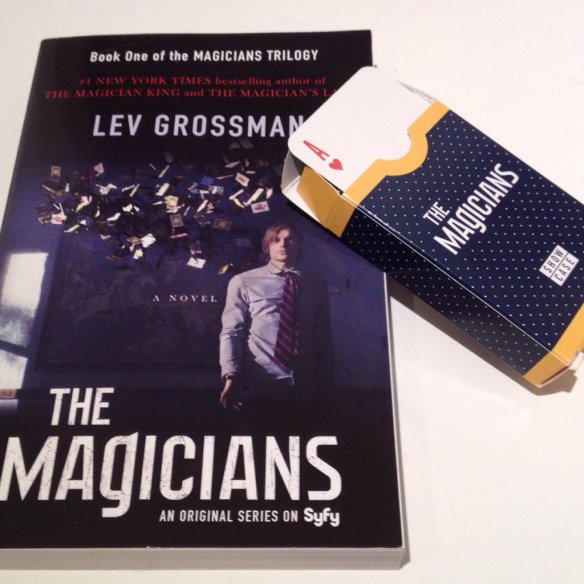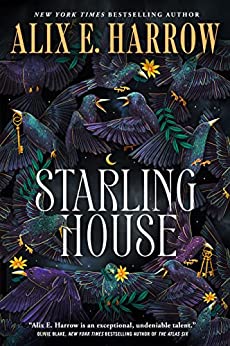
In Lev Grossman’s The Magicians, Quentin Coldwater, a nerdy and melancholy eighteen year old, is recruited to join a magic university in upstate New York called Brakebills. Quentin is obsessed with a children’s fantasy series about a magical land called Fillory, and real life just cannot compare, particularly when he sees himself as both sidekick and jilted suitor in his trio of friends. When invited to study at Brakebills, he hopes he has finally found his meaning in life, his place of belonging, and the thing that will finally bring him happiness.
Grossman riffs off the Harry Potter and Chronicles of Narnia traditions, and presents a rather more sardonic view of magic. As an older student, Eliot, tells Quentin, most people can’t do magic because “it’s very hard, and they’re not obsessive and miserable enough to do all the work you have to do to do it right.” Indeed, unlike Hogwarts which felt wondrous and, well, magical, Brakebills makes magic feel like a particularly rigorous college major, like pre-law or pre-med. During one term for example, students had to study in isolation all the different ways circumstances can change the makeup of a single spell. As Quentin observed, he knew more about that particular spell than he’d ever wanted to know, including how to cast it if he were a woman.
The book continues to follow the characters after graduation, when they struggle to find their place in a world where most people are unaware that magic exists. One of them discovers a portal to Fillory, and, having not quite found the happiness he sought in Brakebills, Quentin turns his attention into possibly finding happiness in the fantasy land of his youth. However, just like Brakebills isn’t quite as wondrous as Hogwarts, nor is Fillory anywhere near as magical as Narnia. The residents in Fillory appear to be in need of something, and while Quentin and his friends decide to go on a quest to become kings and queens of Fillory, the decision resulted more from an understanding of fantasy tropes and classic quest stories than from any real understanding of how the quest’s success will solve Fillory’s troubles.
I liked the story. I hesitate to call it more realistic than traditional magical stories because I like to think real-life magic would still be more exciting and wondrous than Grossman presents. As well, Grossman pulls short of delving deep into realism — while his characters drink a lot and face ennui upon graduation, they also lead charmed lives, with a magical network of corporations guaranteeing magical graduates a comfortable lifetime income for shell corporate jobs. I also hesitate to call it more adult than traditional magical stories, because while there is sex and drugs and certainly less wide-eyed innocence, there is also a naivete about Quentin and his friends’ approach to life, a sort of languorous privileged view that still makes me want to tell some of them to grow up. Still, in a way, both descriptors are accurate. Grossman does raise some interesting complications that could occur if magic and magical lands did exist. I can imagine mastery at magic requiring a lot more tedious memorization than fun tricks, and I can also imagine a magical fantasy land not quite living up to childhood expectations.
Among the characters, I absolutely loved Quentin’s classmates Eliot, a fashionable gourmet, and Alice, a brilliant, talented magician. In contrast, Quentin is not at all a likeable character, at least for me. It’s hard to root for someone who is so consumed by his own ennui and lack of self-worth that he is unable to see that other people around him have problems of their own and that he externalizes blame for his mistakes onto “the sick, empty world they were all in together.” (p. 263)
His attitude towards their quest in Fillory annoys me as well. When Alice points out that people could get hurt, he responds:
“If I die doing this, at least I’ll have done something. Maybe you’ll do something one of these days instead of being such a pathetic little mouse all the time.” (p. 332)
The problem is that they don’t really have a goal or stated need for that quest in the first place. Quentin is just bored with life and decides to find meaning by visiting Fillory, and then literally for lack of anything else to do, decides to go on a quest to become king.
Possibly one of the reasons I love Alice so much is that she calls Quentin out on his behaviour:
“If you will, for just one second, look at your life and see how perfect it is. Stop looking for the next secret door that is going to lead you to your real life. Stop waiting. This is it: there’s nothing else. It’s here, and you’d better decide to enjoy it or your going to be miserable wherever you go, for the rest of your life, forever.”
“You can’t just decide to be happy.”
“No, you can’t. But you can sure as hell decide to be miserable. Is that what you want? Do you want to be the asshole who went to Fillory and was miserable there? Even in Fillory? Because that’s who you are right now.” (p. 333)
The end of the book promises further adventure in the sequel, this time involving Quentin’s childhood friend Julia, who was not accepted into Brakebills and therefore taught herself magic. From what I hear, she is a much more interesting character than Quentin, and the TV show version somewhat conflates both books so that, on the screen, we get her story alongside Quentin’s.
The Magicians TV Adaptation on Showcase
Having read the book, I’m much more excited to see how it translates on the screen, and to see the actors who will bring the characters to life. I also can’t wait to find out more about Julia’s story, as the glimpse I’ve seen of her in the book seems intriguing.
The Magicians premiered last January 25, and airs on Showcase Mondays at 9. Catch up on previous episodes at www.showcase.ca/themagicians and check out a brand-new episode tonight on TV and tomorrow online.
+
Thanks to Showcase.ca for a copy of this book (and awesome card deck!) in exchange for an honest review.
 Starling House is a contemporary gothic fairy tale about an ugly old house full of secrets, the unfortunate man doomed to be its caretaker, and the desperate young woman who may hold the key to turning things around.
Starling House is a contemporary gothic fairy tale about an ugly old house full of secrets, the unfortunate man doomed to be its caretaker, and the desperate young woman who may hold the key to turning things around.
 A prequel to his bestselling
A prequel to his bestselling 